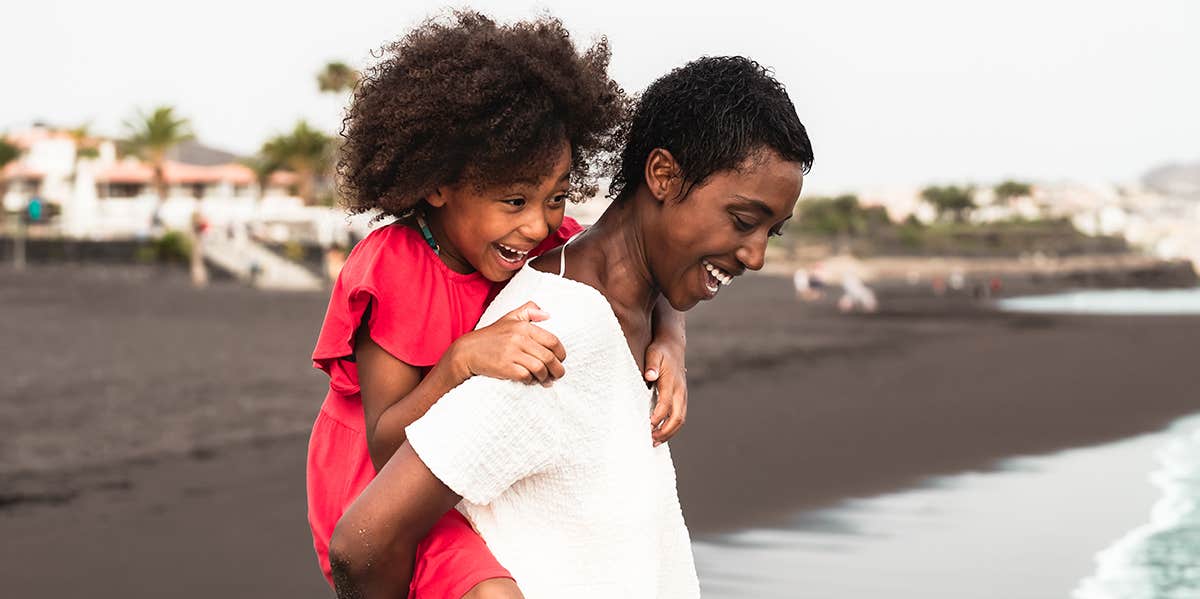No, My Kid Doesn’t Have "Good Hair"
And there’s no need to pinch her nose, either.
 AlessandroBiascioli | Shutterstock
AlessandroBiascioli | Shutterstock "Sit still!"
It’s been thirty years and those words rock my insides, as if they were aimed at me.
I was halfway across the room, watching my cousin’s otherwise light brown skin fill with red blotches along her scalp. With her lips askew and tears welling in her eyes, she cried silently, knowing that our grandmother would hear none of it.
"She hair BAD," Grandmother muttered as she violently waved the comb through dark, thick, and unyielding strands. Strands that simply needed the right tools and the right kind of love. We know that now.
"She hair, BAD!" my grandmother continued.
I was born a boy, which inherently made my life easier.
My hair is also thicker in more places than not, but a short hairstyle and a brush were the expectation, while my cousin succumbed to hours on the floor between an elder's legs, having the hair pulled from her scalp in what was assumed to be an act of love.
You see, she wasn’t born a boy. Life was inherently more difficult.
We grew up in a time when braids were the norm until you were old enough for a perm.
Creamy white chemicals whisked through each strand to make a young girl "beautiful" or "presentable."
I could still smell the burning flesh, see the tears gathering before they fell, and feel the vibrations from the floor as my cousin's legs shook through the pain. And, I could still feel the words rock my insides, as if they were aimed at me.
"Bad hair."
I never talked to my cousin about those memories or how long it took to bury them.
We never spoke about how or when she learned that her hair was beautiful whichever way it grew from her head, nor about what it would mean if that trauma stopped with our generation.
However, I have had those conversations with my wife. We discussed how our daughter is to be loved by us and others, and the repercussions for not loving her in the ways that we’ve deemed appropriate.
We’ve had to check our friends about their use of language and what it means. And, we’ve had to check family.
"There is no good or bad hair."
"There’s nothing wrong with her afro."
"No, she doesn’t look like an Indian when her hair is combed."
"That’s self-hating."
The hard truth: My family is from the Caribbean, where liberation from the queen doesn’t mean liberation from white supremacy.
In our culture, Eurocentric features, textures, and hues are considered beautiful. Fair skin brings you closer to God and melanin is often seen as a stain that needs to be washed out.
We receive daily reminders that we are not worthy and spend most of our lives afraid of our natural reflections.
"Look at that nose. You have a nose bridge. When you were little, I pinched your little nose so that it wouldn’t be wide and flat. Look at you now!"
Thank you?
I once met my mother’s words with a laugh. Now, I cringe at the thought of anyone pinching my child’s nose or forcing a perm on her.
I want her to feel confident in her natural state and I want any choices to change her appearance to come from a place of curiosity and independence, rather than fear of not fitting in.
I want her to know that she is whole and more than worthy. And, I only want to pass along lessons that will serve her.
So no, my kid doesn’t have good hair.
She has so much more than that and so do you.
Jayson Kristopher Jones is a writer and social worker. His work can be found in LEVEL, Blavity, Medium, and others.

